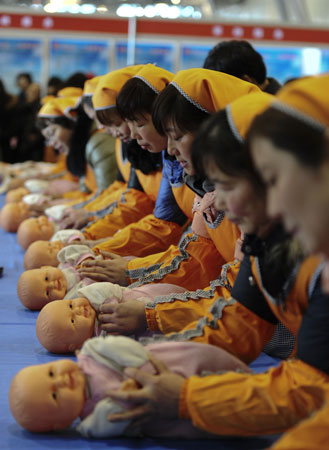Homecare services in demand, but suitable employees lacking
|
 Confinement nurses show how to look after newborn infants in Hefei, Aihui province. Despite the rising demand for homecare workers in China, the market faces increasing difficulties in hiring young and capable employees. Provided to China Daily |
Majority in industry only desire to work for short period of time: report
Companies providing homecare services, such as looking after the elderly and young children, are experiencing a shortfall in suitable applicants, according to a Beijing-based nongovernmental organization.
This is despite a rise in demand for such services, according to the Beijing Cultural Development Center for Rural Women. The center interviewed 1,360 workers in the sector as well as 210 employers and 50 companies.
The survey also highlighted a generation gap in applicants, with those aged over 40 far outnumbering younger applicants.
The majority of respondents, 51 percent, said they only wanted to work in the sector for a brief period.
The companies said they were facing increasing difficulties in hiring "young, capable and hardworking" employees and mobility within the sector means workers change jobs frequently, sometimes within weeks.
The survey suggests homemaking companies may face difficulties hiring employees in the future if they fail to launch training programs.
Li Jielu, general manager of Beijing Ainong Homemaking Service Co, which provides cleaning services, elderly and baby care, said any fresh nursing graduate would shun opportunities in the sector because it lacks a clear career path, the work is demanding and the salaries are not high.
"The salary is not attractive. In fact, homemaking workers only earn on average 4,000 yuan ($651) to 5,000 yuan each month," he said.
He added that such work can be strenuous and most of the sector's workforce, and applicants, are in their 40s.
The home province of applicants is also shifting, Li said.
"Most of the workers previously came from Sichuan and Anhui provinces, traditional labor-exporting provinces, but now more are applying from Gansu and Shaanxi provinces and northeastern China."
Li said this may be because salaries in traditional labor-exporting provinces have improved and workers can now find jobs near home more easily. Living costs in Beijing and Shanghai are also a factor.
Most of the respondents, 96 percent, were female, came from rural areas and were poorly educated.
Moreover, Zhou Yuanhong, chairman of Beijing Jialehui Homemaking Service Co, which offers babysitting services, said few employees take pride in their work or the sector because they think their job is not respected.
Hu Dawu, a professor at Southwest University of Political Science and Law, suggested an approach to solve the worker shortage.
"The government should consider stepping into the sector and concentrate on boosting training for employees."
fanfeifei@chinadaily.com.cn


















